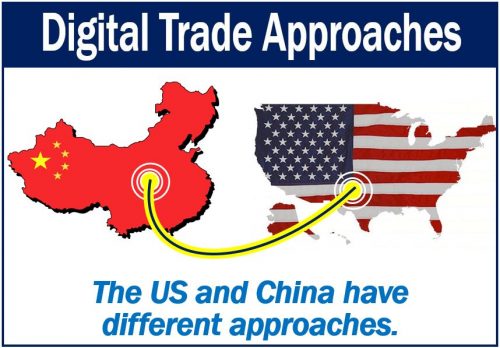The United States and China view digital trade differently; a team of researchers has found. In other words, they have contrasting approaches to e-commerce. If they acknowledge their different approaches to digital trade, policymakers might find ways to eliminate trade barriers. This is what Prof. Henry Gao believes.
Gao is an Associate Professor at the Singapore Management University School of Law.
In this context, e-commerce and digital trade have the same meaning.
He wrote about his study and findings in the Journal of International Economic Law (citation below). It was the first comparative study of the two countries’ different approaches to issues related to digital trade.
The Internet brought digital trade
Digital trade emerged soon after the advent of the Internet. Suddenly, the sales of goods and services were no longer an exclusively physical experience with storefronts and geographical borders.
E-commerce, which stands for electronic commerce, today is worth trillions of dollars worldwide.
The advent of digital trade has significantly raised the stakes for companies.
In many cases, the precise definitions of digital products and whether they should be subject to customs duties, tariffs, or quotas is still unclear. They are unclear, specifically, at the international level. In other words, digital trade between countries.

Digital trade regulation
In this study, the author tracked digital trade regulations by the World Trade Organization. He highlighted that its members have so far not been able to reach an agreement on the rules governing digital trade.
Prof. Gao also noted that the world’s ten biggest Internet companies are all American or Chinese businesses. This suggests that the US and China are poised to play major roles in crafting international e-commerce regulations.
The ten largest Internet companies are Amazon, Google (Alphabet), Facebook, Priceline, eBay, Netflix, JD.com, Baidu, Tencent, and Alibaba.
Prof. Gao examined proposals made by the two countries at several economic fora (or forums) and the WTO. He also examined e-commerce clauses in each country’s free trade agreements. He subsequently documented a stark difference in China’s and America’s positions on digital trade.
The two countries focus on different things
Prof. Gao explained:
“The US tends to focus more on the ‘digital’ side [of e-commerce], which includes internet search and social networking.”
“China, however, focuses more on the traditional ‘trade’ side, that is, trade in goods. In other words, the US trades bits while China still trades atoms.”
The US, therefore, cares more about digital barriers such as Internet censorship and cross-border data flow restrictions.
China, on the other hand, is more concerned about traditional trade barriers such as tariffs, the author argues.
Different domestic regulatory frameworks
Additionally, the two nations’ distinct domestic regulatory frameworks influence their stances on digital trade regulation.
Let market forces determine
The United States has a historical preference to let market forces determine acceptable boundaries for e-commerce and the Internet domestically. The term ‘Market forces’ refers to the forces of supply and demand.
The US has also expressed a preference for deregulation regarding digital trade at international level.
Strong government control
China, on the other hand, has opted for stronger government control over the Internet. This standpoint is embedded in its e-commerce proposals to the WTO, Prof. Gao noted.
Regarding China’s and America’s deeply entrenched differences, Prof. Gao suggests:
“These deeply entrenched differences will require time to reconcile. To move forward, perhaps both countries could start with issues where they share some common interests, such as a permanent moratorium on customs duties on e-commerce.”
Citation
“Digital or Trade? The Contrasting Approaches of China and US to Digital Trade,” Henry S. Gao, Journal of International Economic Law, Volume 21, Issue 2, 1 June 2018, Pages 297-321, DOI: 10.1093/jiel/jgy015.
